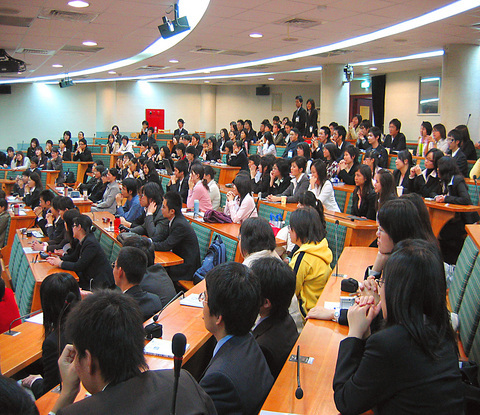It was early last Friday morning and National Taiwan University was already bustling with college life. Students were frantically grabbing their last gulp of morning coffee and bicycles are racing up and down through the campus. Yet a huge group of students in crisp clean business suits were already lined up in front of the Institute of Applied Mechanics.
Passers-by stared into the main lobby, wondering what the bustling excitement was all about. A huge banner above the entrance explained everything. "Second NTU Taiwan National MUN Opening Ceremony." Started last year by the NTU Model UN club, this three day event is so far the only nation wide student conference in Taiwan simulating the real UN.
After attending World Model UN con-ferences held by Harvard University in places ranging from Heidelberg, Germany to Sharm-El Sheik, Egypt, the staff last year decided that the next logical step would be to contribute their experience back home, where few students know what the UN flag looks like.

PHOTO: JOEY CHUNG, TAIPEI TIMES
The First National MUN was held in December last year with two committees and more than 150 students from across the country. This year, however the goal was clear from the start. Expansion.
"It was important that it not only continued every year but expanded in committee and delegate numbers. This way more Taiwan students in the future can experience what foreign students have already enjoyed for years," said Michelle Ma (
There were three committees this year and more than 180 delegates. Within the three committees (The World Trade Organization, the Association of Southeast Asian Nations, and the Social, Humanitarian and Cultural Committee) delegates tried to reach a consensus on textile disputes, immigration and post-tsunami relief.
"I've been an engineering student ever since high school, so this is really not my field," said Kidd Chen (
"Yet that was why I ultimately attended, to see how students from different fields in Taiwan thought and how we would interact. This is a rare chance in Taiwan especially on this scale," Chen said.
He found a seat only minutes before guests including Taipei Mayor Ma Ying-Jiou (馬英九) and The Ministry of Foreign Affairs Spokesperson Lu Ching-Long (呂慶龍) arrived for the opening ceremony. Later the delegates assembled in different conference rooms for their committees for four sessions of debate.
By Sunday afternoon as delegates gathered for the closing ceremony, the atmosphere was obviously ecstatic. After days of heated debate, students from Taipei were now extremely close with students from Kaohsiung, by sharing alliances that resulted in the safeguarding of mutual national interests.
With the introduction of next year's secretary general and the thump as the gavel hit the podium, the closing ceremony ended in a burst of applause and hugs. As the delegates gathered their laptops and suit jackets, next year's NTU MUN staff is already discussing what the third Taiwan National MUN should be like.
In the short term, Taiwan may not be a part of the UN, but at least it is certain that the UN will be a part of Taiwan.

June 2 to June 8 Taiwan’s woodcutters believe that if they see even one speck of red in their cooked rice, no matter how small, an accident is going to happen. Peng Chin-tian (彭錦田) swears that this has proven to be true at every stop during his decades-long career in the logging industry. Along with mining, timber harvesting was once considered the most dangerous profession in Taiwan. Not only were mishaps common during all stages of processing, it was difficult to transport the injured to get medical treatment. Many died during the arduous journey. Peng recounts some of his accidents in

“Why does Taiwan identity decline?”a group of researchers lead by University of Nevada political scientist Austin Wang (王宏恩) asked in a recent paper. After all, it is not difficult to explain the rise in Taiwanese identity after the early 1990s. But no model predicted its decline during the 2016-2018 period, they say. After testing various alternative explanations, Wang et al argue that the fall-off in Taiwanese identity during that period is related to voter hedging based on the performance of the Democratic Progressive Party (DPP). Since the DPP is perceived as the guardian of Taiwan identity, when it performs well,

A short walk beneath the dense Amazon canopy, the forest abruptly opens up. Fallen logs are rotting, the trees grow sparser and the temperature rises in places sunlight hits the ground. This is what 24 years of severe drought looks like in the world’s largest rainforest. But this patch of degraded forest, about the size of a soccer field, is a scientific experiment. Launched in 2000 by Brazilian and British scientists, Esecaflor — short for “Forest Drought Study Project” in Portuguese — set out to simulate a future in which the changing climate could deplete the Amazon of rainfall. It is

The Taiwan People’s Party (TPP) on May 18 held a rally in Taichung to mark the anniversary of President William Lai’s (賴清德) inauguration on May 20. The title of the rally could be loosely translated to “May 18 recall fraudulent goods” (518退貨ㄌㄨㄚˋ!). Unlike in English, where the terms are the same, “recall” (退貨) in this context refers to product recalls due to damaged, defective or fraudulent merchandise, not the political recalls (罷免) currently dominating the headlines. I attended the rally to determine if the impression was correct that the TPP under party Chairman Huang Kuo-Chang (黃國昌) had little of a